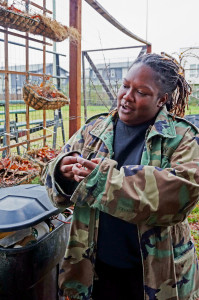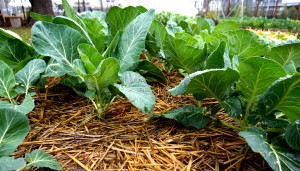Acta Non Verba Farm Grows in East Oakland
Feb 27, 2014
By Richard Kevin Cartwright
Walking through the wide expanse of nurtured and cultivated vegetable beds – a seemingly endless array of broccoli, an almond tree, lemons hanging from struggling branches, among others – one cannot help but wonder if Acta Non Verba Farm is a hidden away oasis in the midst of decades-old disrepair and intransigence.
Kelly Carlisle doesn’t call herself a miracle worker, a do-gooder or even an agent of change. She calls herself a farmer.
“The fact that I call myself a farmer is highly offensive to many people I’ve talked to,” Carlisle said. “They look at me as if I’m from another planet sometimes. But, I am a farmer. Bottom line. ”
Not only is she a farmer, but clearly a very good one.
The beds of greens, broccoli, cabbage, and fava bean bouquets suggest someone in tune with the process of seed to soil, cultivation and growth. Acta Non Verba Farm is a quarter acre plot located at Tassaforanga Park, a square area surrounded by the David Baker designed Tassaforanga housing complexes. Much of the farming and nurturance has come from Carlisle herself, along with the assistance of students from Oakland public schools – Kindergarten through 8th grades – helping during the entire process from seed to mature vegetable.

Farmer Kelly Carlisle. Photos by Carrie LeCompte
And as a result, 100 percent of the proceeds from homemade salsa, jam, marinara sauce and other items made from their vegetables and by them, go towards their savings accounts.
“I have to keep looking at the babies. I’m trying my best to cultivate their imaginations, to help them remain open to the wonder of this beautiful gift of growing our own food,” she said.
Carlisle wasn’t always open to the wonder of growing her own food. She tells of how she thought of her parents as backwards for growing rows of collard greens, tomato plots and a pecan tree in their backyard.

It wasn’t until after having been laid off from a corporate job during the initial days of Barack Obama’s first term as president that she began r thinking about the meaning of her life.
She bought lemons from a local store that looked and felt prefabricated. “I just knew those things they called lemons didn’t grow from a lemon tree,” she said. “I knew better than that. I decided right there that I wanted to grow something.”
“I believe that was my Sankofa moment,” she said. “I knew I was meant to grow food; that it was deep in my blood.”
Now, the challenges for Carlisle and others in the East Oakland neighborhood is a belief that there can not only be a sustainable community farm that provides food to an area without a viable supermarket or healthy food options, but that everyday people can discard years of trauma and neglect to grow and support food development.
“Some in the community love that we are here, but so many don’t recognize that we are here,” she said.
Access to land is another source of resistance to Carlisle and her desire to expand food production in East Oakland. Landowners and decision-makers allow multiple acres of land throughout East Oakland to sit fallow and unattended.
Carlisle has implored leaders to implement AB 551 (Urban Agriculture Incentive Zones), which offers tax incentives to landowners with lots to put their land to agricultural use. Thus far, the only audible thing she has heard has been the shuffling of feet and echoes of slamming doors in her face.
“It’s a very interesting dynamic to see when we say we want to actually produce our own food, to not be dependent on other people for our survival,” she said.
In the meantime, Carlisle continues to cultivate her calling. “The plants are always teaching me lessons, nurturing life lessons,” she said.
For information about the farm, go to: http://anv2014.wordpress.com/ or call (510) 972-3276. The farm is located a: 1001 83rd Ave. in Oakland.